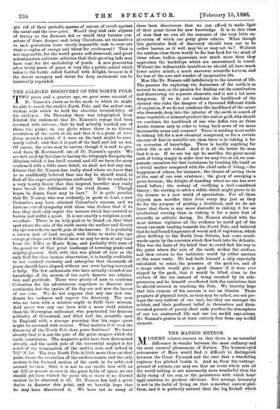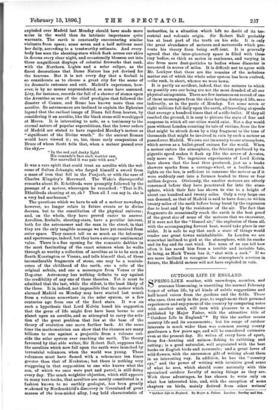THE MADRID METEOR.
MODERN science assures us that there is no essential difference in wonder between the most ordinary and the moat unusual phenomena of Nature. The keenest-eyed astronomer of Mars would find it difficult to distinguish between the Great Pyramid and the tent that a wandering explorer has pitched beside it. And so, from the vantage- ground of science, one may see that an event which sets all the world talking is not necessarily more wonderful than the daily rising of the sun, or the persistence with which hens' eggs continue to produce chickens. But average humanity is not in the habit of living on that somewhat austere plat- form, and it is perfectly natural that the big fireball which exploded over Madrid last Monday should have made more 'noise in the world than its intrinsic importance quite warrants. The earth is constantly encountering similar visitants from space; some seven and a half millions meet her daily, according to a trustworthy estimate. And every. body has seen the shooting-stars which flash across our skies in dozens every clear night, and occasionally blossom out into those magnificent displays of celestial fireworks that rank, with the Northern Lights and a solar eclipse, as the finest decorations that Dame Nature has yet devised for the heavens. But it is not every day that a fireball is so considerate as to choose a great city for the scene of its dramatic entrance and exit. Madrid's experience, how- ever, is by no means unprecedented, as some have assumed. Liu, for instance, records the fall of a shower of stones upon the Aventine as one of the chief prodigies that followed the disaster of Cannre, and Rome has known more than one aerolite. So astronomers are inclined to explain the Ephesian legend that the earliest image of Diana fell from heaven, by .considering it an aerolite, like the black stone still worshipped at Mecca. It is interesting to note, as a testimony to the eternal nature of popular superstitions, that the lower orders of Madrid are stated to have regarded Monday's meteor as " significant of the Divine wrath." So the ancient Roman would have viewed it; so, too, those early companions of Bruce of whom Scott tells that, when a meteor passed over the sky,—
"In the red and dusky light His comrade's face each warrior saw, Nor marvelled it was pale with awe."
It was a rare spirit that could treat an aerolite with the wel- come of Sultan Jehangir, who forged himself a sword from a mass of iron that fell in the Punjaub, or with the ease of Charles Kingsley's Hereward. The Wake's disrespectful remarks about St. Etheldreda were promptly followed by the passage of a meteor, whereupon he remarked: That is St. Etheldreda shooting at us, eh ? Then all I can say is, she is a very bad marksman."
The questions which we have to ask of a meteor nowadays, however, no longer relate to future events or to divine decrees, but to the constitution of the physical universe; and, on the whole, they have proved easier to answer. Aerolites, fireballs, shooting-stars, have a peculiar interest, both for the astronomer and the man in the street, in that they are the only tangible message we have yet received from outer space. They cannot tell us so much as the telescope and spectroscope, indeed, but they have a stronger sentimental value. There is a fine opening for the romantic dabbler in the most fascinating of the exact sciences when he walks through so worthy a collection of aerolites as is to be seen at South Kensington or Vienna, and tells himself that, of these inconsiderable fragments of stone, one may be a reminis- cence of the childhood of the earth, one a relic of the original nebula, and one a messenger from Venus or the Dog-star. Astronomy has nothing definite to say against the credibility of any one of these theories. Yet it must be admitted that the last, while the oldest, is the least likely of the three. It is, indeed, not impossible that the meteor which alarmed Madrid on Monday may have started last month from a volcano somewhere in the solar system, or a few centuries ago from one of the fixed stars. It w is on such a hypothesis that Lord Kelvin based his suggestion that the germ of life might first have been borne to our planet upon an aerolite, and so attempted to carry the solu- tion of the great problem that lies at the base of the theory of evolution one move farther back. At the same time the mathematician can show that the chances are many billions to one against a projectile from a volcano out- side the solar system ever reaching the earth. The theory favoured by that able writer, Sir Robert Ball, supposes that the aerolites which now fall upon the earth were launched by terrestrial volcanoes, when the world was young. These volcanoes must have flamed with a vehemence ten times greater than that of Krakatoa; but there is nothing very staggering in that supposition to one who knows what the sun, of which we once were part and parcel, is still doing every day. The much weightier objection, which still appears in many text-books, that aerolites are mostly constituted in a fashion known to no earthly geologist, has been greatly weakened by Nordenskiold's discovery in Greenland of great masses of the iron-nickel alloy, hug held characteristic of meteorites, in a situation which left no doubt of its ter- restrial and volcanic origin. Sir Robert Ball probably has at least part of the truth on his side. It is only the great abundance of meteors and meteoroids which pre- vents his theory from being sufficient. It is generally agreed that the inter-planetary space is filled with these tiny bodies, as thick as motes in sunbeams, and varying in size from mere dust-particles to bodies whose diameter is measured in scores of miles. It is difficult not to agree with Mr. Lockyer that these are the remains of the nebulous matter out of which the whole solar system has been evolved, —the rock, in short, whence we were hewn.
It is partly an accident, indeed, that the meteors to which we possibly owe our being are not the most dreaded of all our physical antagonists. There are few instances on record of one of these messengers from the skies having destroyed life, save indirectly, as in the panic of Monday. Yet some seven or eight millions fall daily upon the earth, all travelling at speeds that average a hundred times that of a rifle-bullet. If they all reached the ground, it is easy to picture the state of fear and suspense in which all our cities would exist. Not a day would pass without London counting its tale of victims, from the few that might be struck down by a tiny fragment to the tens of thousands that might be involved in ruin by such a meteor as passed over Madrid. We owe our immunity to our atmosphere, which serves as a bullet-proof cuirass for the world. When a meteor enters the atmosphere, the friction produced by its gigantic speed makes it flash up like the arrow of Acestes, only more so. The ingenious experiments of Lord Kelvin, have shown that the heat thus produced, just as a brake showers sparks from a carriage-wheel, or a lucifer-match lights on the box, is sufficient to consume the meteor as if it were suddenly cast into a furnace heated to three or four million degrees. Obviously, the smaller meteors are utterly consumed before they have penetrated far into the atmo- sphere, which their fate has shown to rise to a height of about one hundred and twenty miles. Only a very large one can descend, as that of Madrid is said to have done, to within twenty miles of the earth before being buret by the expansion due to heat and by the resistance of the air. The fact that fragments do occasionally reach the earth is the best proof of the great size of some of the meteors that we encounter. If it were not for the " blessed air," the explosion of them all, with the accompanying fervent heat, would take place in our midst. It is safe to say that such a state of things would render our great towns uninhabitable. In London we are somewhat inclined to gird at the atmosphere, with its smoke and its fog and its east wind. But none of us can tell bow often it has saved him from a terrible and invisible fate, in being, as Mark Twain has it, "shot with a rock." If wo are more inclined to recognise the atmosphere's services in future, the Madrid meteor will not have exploded in vain.



































 Previous page
Previous page